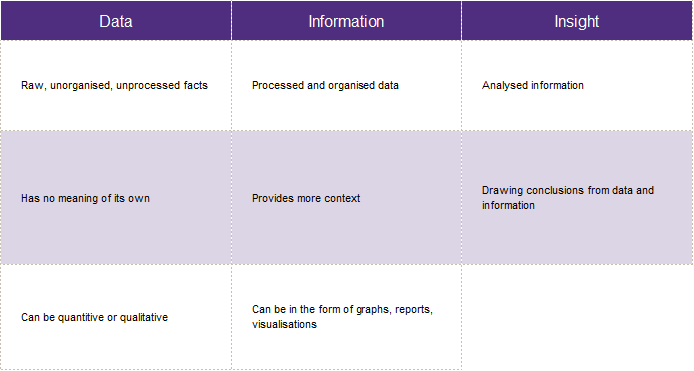Data analysis is all about solving organisational needs but analysis alone won’t help you make decisions or turn those decisions into action. The missing link between analysis and action is insight. In our latest article on Making Best Informed Decisions, you'll find out what's needed to turn your data analysis into useful insight for decision making.
You'll start to see how you can get your people to move from ‘what’ the data analysis tells you towards ‘so what’ does this mean for the organisation, and ‘now what’ are the potential and proposed next steps. The approach shifts the data into information, and then again into insight used for decision making.
Data, insight, information – what's the difference?
Data, information, insight – these terms might all feel like the same thing but they’re quite different. The image below shares the distinct differences between the three. Data is the raw facts that are processed and summarised into information which demonstrates trends and is more readily understood by humans. This information combined with commercial context and intangible knowledge creates the link through to insight.

What insight do you need?
To make a best-informed decision you need accurate hindsight of what’s happened and why, what it means for the business, and calculated foresight to depict what could, and what should, happen next. These stages correlate to the four stages of data analytics: descriptive, diagnostic, predictive and prescriptive.
How far up the scale you can go from analytics will depend on how digitally mature your organisation is. The further down the scale you are, the more reliant you are on human experiences and expertise to generate the insight. Yet even with prescriptive analytics, this should always be combined with a human lens because generating good, ethical insight is hard to automate. This is the effective combination of rational thinking and instinct.

Six key skills for cultivating insight
Many organisations are spending a lot of time and energy upskilling their people in technical digital skills to extract, analyse and visualise data. Digital skills get you to the point of data analysis but generating insight requires something more.
All the skills needed in data analysis are covered in more detail below. They include the non-technical competencies required to explain the results where the data alone might not, and also support scenario planning where the data might not exist.

1 Commercial acumen
Many employees are specialists in their own areas and their time is taken up with much of the day to day. To solve organisation-level needs, they will benefit from taking a step back and building a good comprehension of how a business runs, as well as the common objectives and growth strategies available.
For example, an appreciation of the shareholder objectives, such as the intention to list on a stock exchange, or the appetite for investment in tech, will inform how decisions will be made.
2 Domain knowledge
Generating insight requires an accurate, intuitive and in-depth understanding of a situation. Informed insight requires detailed intelligence that can only be gained locally. Such skills can come through working closely with customers, developing sector, and market understanding, and gaining familiarity with the factors that influence the company’s performance.
3 Business partnering skills
Domain knowledge and level of thinking (detailed or strategic) will vary across the organisation. No one person can do it all. It takes collaboration across the business to collectively interpret the data.
Integrating business partnering across the organisation can help achieve this. Business partnering is the application of advanced analysis, insight, influence, and challenge from across the business functions. This could be in a formal spoke-and-cogs organisation design, or a more informal culture that strives to break down siloed working. In either scenario, those involved will need the skills to appreciate the needs of others, elicit the right information and apply emotional intelligence.
4 Ethical principles
Unfortunately, not all insight is valuable. In fact, sometimes it can be outright wrong, which can have serious consequences. A common example is misinterpreting analysis in order to fit with pre-existing assumptions or desired outcomes. Ethical guiding principles need to be well established to produce insight that’s complete, accurate, and not misleading.
It's widely acknowledged that data and human interpretations of data are both innately biased. Building the understanding of how people make judgements and reach conclusions will help slow down and consciously improve decision making to avoid misinterpretation.
5 Creativity
Solving problems and making strategic decisions are not always logical, straightforward processes. They can be complex, surprising, and even emotional. This is where the human element comes in – adding a layer of processing that technology cannot replicate. An inquisitive nature, creative mindset, experimental approach and openness to failure will help uncover new insights and options that form a key differentiator to your competitors.
6 Methodical approaches to generating insight
You, or your people, might have all the right skills but deploying them to interpret the data is a skill in itself. How do you facilitate this application of skills, knowledge and judgement?
Building a framework that’s tailored to your organisation's sector, size and strategy – but broad enough to support all colleagues – will give people the tools to structure their thinking. A simple and memorable structure we like to use is moving from the ‘what’ to the ‘so what’, to the ‘now what’. Within this, you can consider the data through different lenses and build the talent to think broadly, strategically and in depth.
Making best informed decisions
It takes a blend of all these skills to be able to get the most out of business data. As an example, a construction client needed to make better informed decisions around the sales process. The biggest improvement came not from new technology or more extensive reporting, but from adopting a business partnering approach with other parts of the business to apply a greater level of emotional intelligence in the way they challenged the business. These skills helped to shift the long-ingrained mindset around bidding and drive tangible changes that improved profit margins.
Wherever you are in your data journey, these skills will move your organisation towards a consistent process for generating insight. By creating a workforce that is self-aware of how decisions are made, and creating a structured approach to interpreting data analysis and making decisions, you're laying the essential groundwork for integrating artificial intelligence and growing in digital maturity.
For support developing the digital and broader skills of your team, and cultivating insight from your data analysis, get in touch with Carolyn Sansom.
![]()


